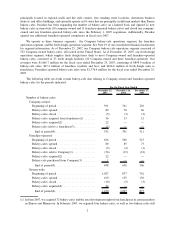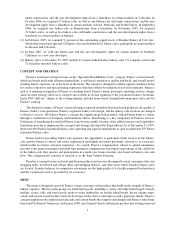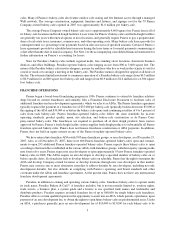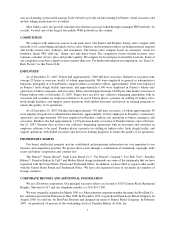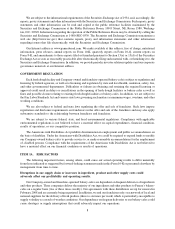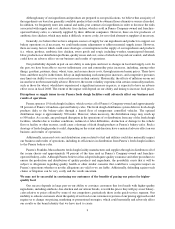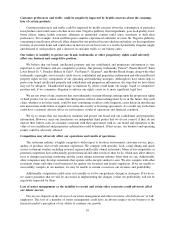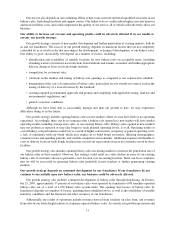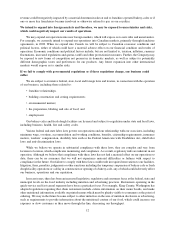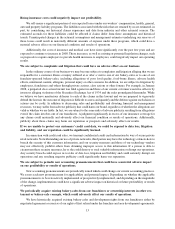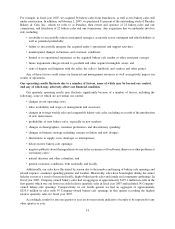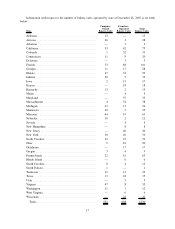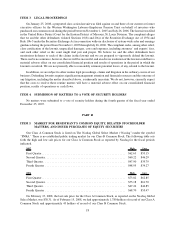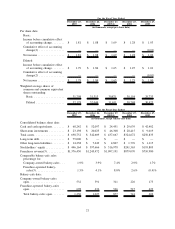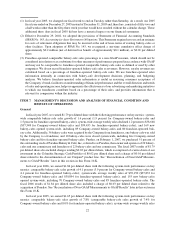Panera Bread 2007 Annual Report Download - page 22
Download and view the complete annual report
Please find page 22 of the 2007 Panera Bread annual report below. You can navigate through the pages in the report by either clicking on the pages listed below, or by using the keyword search tool below to find specific information within the annual report.revenue could be negatively impacted by a material downturn in sales at and to franchise-operated bakery-cafes or if
one or more key franchisees became insolvent or otherwise refused to pay us our royalties.
We intend to expand into foreign markets and therefore, we may be exposed to uncertainties and risks,
which could negatively impact our results of operations.
We may expand our operations into new foreign markets, which will expose us to new risks and uncertainties.
For example, we currently intend to expand our operations into Canadian markets, primarily through franchisee
agreements, in 2008. When we expand into Canada we will be subject to Canadian economic conditions and
political factors, either of which could have a material adverse effect on our financial condition and results of
operations. Economic conditions and political factors include, but are not limited to, taxation, inflation, currency
fluctuations, increased regulations and quotas, tariffs and other protectionist measures. Further, the Company may
be exposed to new forms of competition not present in its domestic markets, as well as subject to potentially
different demographic tastes and preferences for our products. Any future expansion into other international
markets would expose us to similar risks.
If we fail to comply with governmental regulations or if these regulations change, our business could
suffer.
We are subject to extensive federal, state, local and foreign laws and treaties, in connection with the operation
of our business, including those related to:
• franchise relationships;
• building construction and zoning requirements;
• environmental matters;
• the preparation, labeling and sale of food; and
• employment.
Our bakery-cafes and fresh dough facilities are licensed and subject to regulation under state and local laws,
including business, health, fire and safety codes.
Various federal and state labor laws govern our operations and our relationship with our associates, including
minimum wage, overtime, accommodation and working conditions, benefits, citizenship requirements, insurance
matters, workers’ compensation, disability laws such as the Federal Americans with Disabilities Act, child labor
laws and anti-discrimination laws.
While we believe we operate in substantial compliance with these laws, they are complex and vary from
location to location, which complicates monitoring and compliance. As a result, regulatory risks are inherent in our
operation. Although we believe that compliance with these laws has not had a material effect on our operations to
date, there can be no assurance that we will not experience material difficulties or failures with respect to
compliance in the future. Our failure to comply with these laws could result in required renovations to our facilities,
litigation, fines, penalties, judgments or other sanctions including the temporary suspension of bakery-cafe or fresh
dough facility operations or a delay in construction or opening of a bakery-cafe, any of which could adversely affect
our business, operations and our reputation.
In recent years, there has been an increased legislative, regulatory and consumer focus at the federal, state and
municipal levels on the food industry including nutrition and advertising practices. Restaurants operating in the
quick-service and fast-casual segments have been a particular focus. For example, King County, Washington has
adopted regulations requiring that chain restaurants include calorie information on their menu boards, and make
other nutritional information available on printed menus which must be plainly visible to consumers at the point of
ordering. We may in the future become subject to other initiatives in the area of nutrition disclosure or advertising,
such as requirements to provide information about the nutritional content of our food, which could increase our
expenses or slow customers as they move through the line, decreasing our throughput.
12


